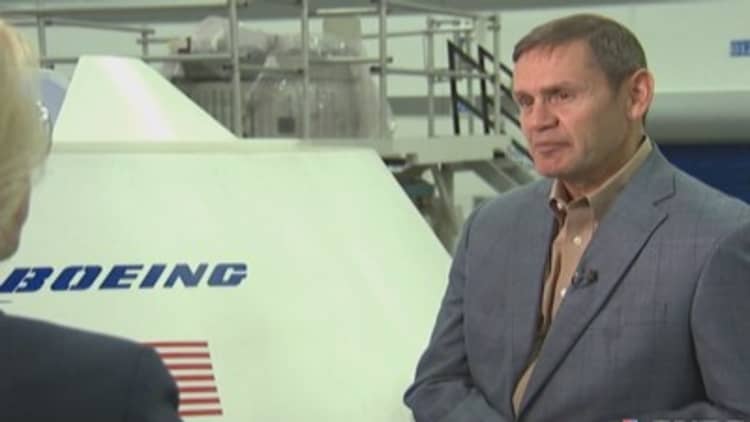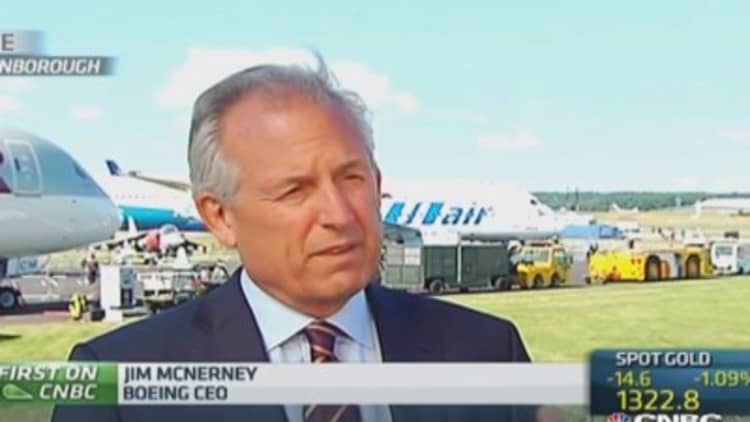
Back when President John Kennedy urged the nation to get to the moon ASAP, or when America decided to send rovers to Mars, space programs benefited from a desire by the U.S. to explore beyond our planet—and stay one step ahead of potential adversaries.
In those days, NASA had a bigger budget and was able to give lots of money to a few key contractors for large projects. The benefits seemed obvious. Americans would get to the moon and Mars first, ahead of the Russians. Also, the technology coming out of those endeavors made lives down on Earth easier—GPS, cordless tools, smoke detectors, satellite TV.
Then the Cold War ended, a couple of space shuttle missions turned disastrous, and everything got a lot more expensive. NASA took a back seat in both hearts and minds.
Read MoreAn inside look at Boeing's space taxi
The last decade, however, has seen a renewed interest in space, thanks to private sector billionaires with deep pockets and a long time horizon: Elon Musk, Richard Branson, Paul Allen, Robert Bigelow, Jeff Bezos. They've changed the way the space business is conducted, and NASA has adapted to survive.
So have older partners like Boeing.
There's a job for us to do of educating the public on, first of all, the small amount that is spent, and secondly, the incredible benefits that come from that, that affect us here on earth.John ElbonBoeing VP and general manager, Space Exploration
"What we will do in the future has been less certain," said John Elbon, Boeing's VP and general manager for space exploration. "There's been a lot of morphing, a lot of new competition, a lot of change in programs, and so that's changed the way we approach things."
One of new approaches is the way NASA is only partially funding three competitors for a space taxi to take astronauts to the International Space Station. One of the bidders is Boeing, and if it loses the contract to a relative start-up like SpaceX or Sierra Nevada, it will further signal that a past relationship with NASA doesn't guarantee a future one.
Read MoreCould a plane be hijacked by cyberhackers?
However, some programs are being handled in more traditional ways, programs that are so expensive and considered so important that only a government agency with billions of dollars can fund it. One such program is the Space Launch System (SLS) rocket, which Boeing will have a huge part in. NASA just awarded the company $2.8 billion to build the core part of the heavy lift rocket, which will take a space capsule built by Lockheed Martin called the Orion deeper into space, possibly even sending astronauts to Mars someday.
"The SLS is an amazing rocket; it's bigger than the Apollo rocket that took us to the moon," Elbon said.
Boeing will be using a lot of rocket science from the shuttle program in the SLS, but Elbon expects new technology to help reduce the cost of manufacturing and operating the one or two rockets a year NASA may need. What about reusing rockets? SpaceX is working on that technology.
"If an aircraft was thrown away after every flight, nobody would be able to afford to fly," SpaceX's Musk said in May, suggesting reusable rockets are necessary for space to become affordable.
The SLS, however, will not be reusable.
"I think it's feasible for rockets of the size that SpaceX is working on," Elbon said. "For rockets like the SLS, at least with the tools that we have today, I don't think that's a reasonable design goal, at least at this point."

Taxpayers will eye all of this with a critical eye. Why spend billions to go to Mars? Why even continue supporting the space station?
Read MoreF-35 debut hopes revived with 'limited' flights
"There's a job for us to do of educating the public on, first of all, the small amount that is spent, and secondly, the incredible benefits that come from that, that affect us here on Earth," Elbon said.
He said the total NASA budget is 0.4 percent of national spending. What do we get for that? Research and, sometimes, results.
"Research in protein crystal growth (done on the space station) has very high potential of leading to a cure for Duchenne Muscular Dystrophy. It's an awful disease," Elbon said. "Because of research done on (the) station, there's now a treatment for that being tested in Osaka, Japan."
Still, in a company the size of Boeing, space contracts are a lot harder to win than orders for 787s, and the space division is not the revenue generator it once was.
Read MoreCould a plane be hijacked by cyberhackers?
"If you look at our balance sheet, our revenues, it's not a huge percentage of what the Boeing Company does," Elbon admited. "If you look at our brand and the things that we advertise, the things that we identify with—space, human space flight, is real important to what we do."
Yet the company must survive in a much tougher environment facing smaller, nimbler, well-funded players who don't have to answer to shareholders. Elbon is optimistic.
"Boeing is an aerospace company," he said. "Human spaceflight is kind of the cutting edge of aerospace, and it's incredibly important that we're involved in that, that we're a leader in that."
—By CNBC's Jane Wells


